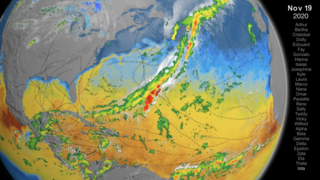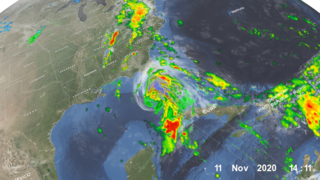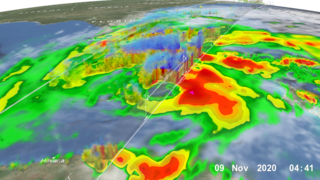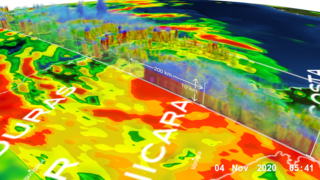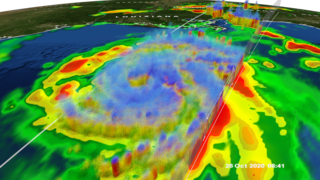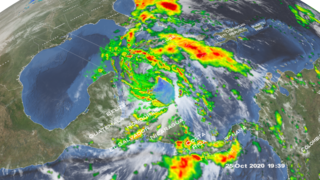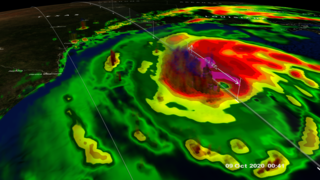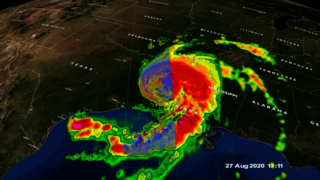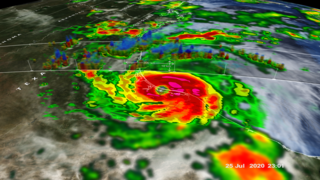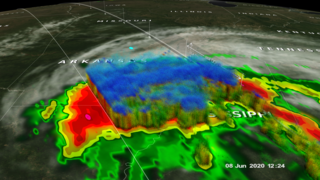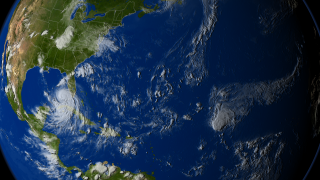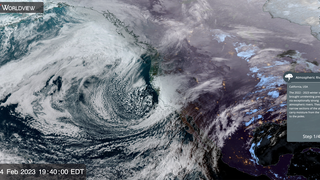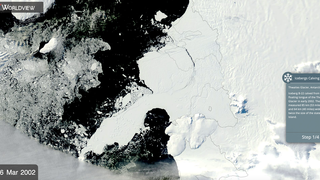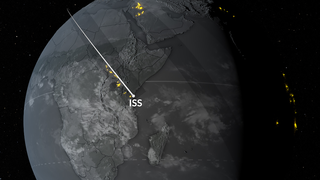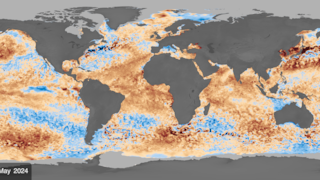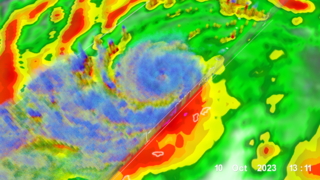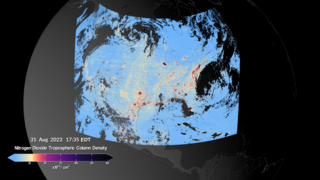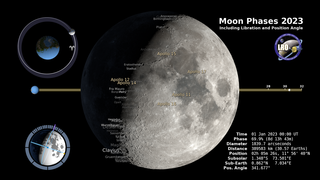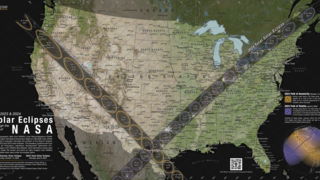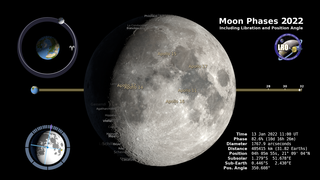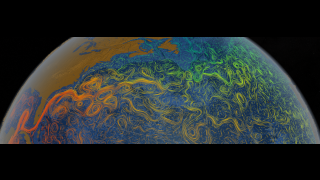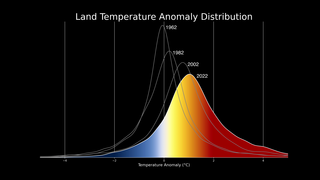Earth
ID: 4884
The 2020 Atlantic hurricane season smashed records with an unprecedented 30 named storms, marking the fifth year in a row with above-average hurricane activity. The National Weather Service noted that every mile of the U.S. Atlantic coast was under a tropical watch or warning in 2020. NOAA reported the most billion-dollar disasters in the U.S. in a single year in the 40 years of record-keeping, with significant contributions from the five storms that made landfall in the U.S.
This visualization shows the hurricanes and tropical storms of 2020 as seen by NASA’s Integrated Multi-satellitE Retrievals for GPM (IMERG) - a data product combining precipitation observations from infrared and microwave satellite sensors united by the GPM Core Observatory. IMERG provides near real-time half-hourly precipitation estimates at ~10km resolution for the entire globe, helping researchers better understand Earth’s water cycle and extreme weather events, with applications for disaster management, tracking disease, resource management, energy production and food security. IMERG rain rates (in mm/hr) are overlaid on infrared cloud data from the NOAA Climate Prediction Center (CPC) Cloud Composite dataset together with storm tracks from the NOAA National Hurricane Center (NHC) Automated Tropical Cyclone Forecasting (ATCF) model. Sea surface temperatures (SST) are also shown over the oceans, derived from the NASA Multi-sensor Ultra-high Resolution (MUR) dataset, which combines data from multiple geostationary and orbiting satellites. Sea surface temperatures play an important role in hurricane formation and development, with warmer temperatures linked to more intense storms. 2020 was the warmest year on record, and this year’s hurricane season brought many examples of storms that intensified quickly: ten of the 30 named storms showed rapid intensification.



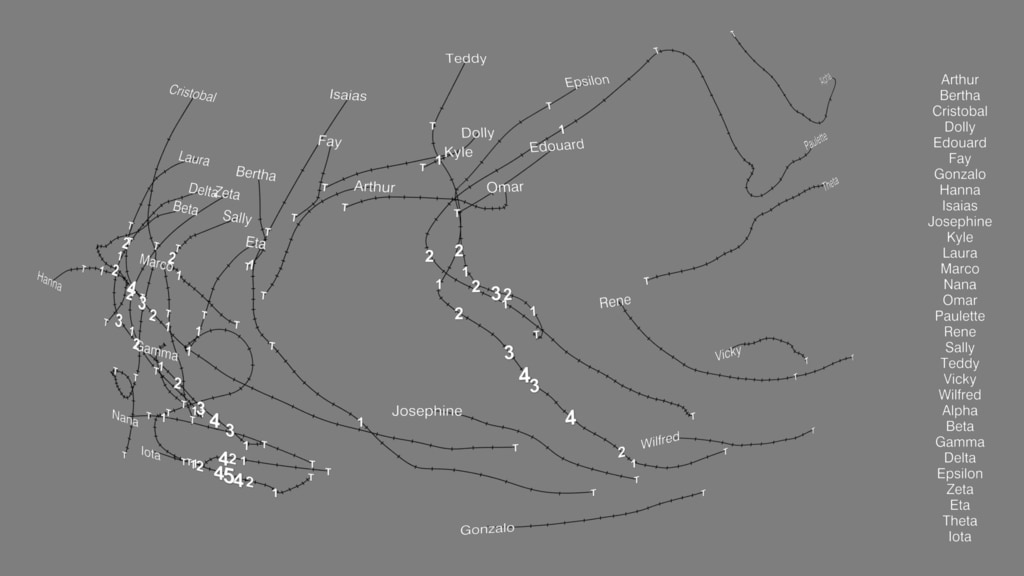
2020 Hurricane Season
This visualization shows the hurricanes and tropical storms of 2020 as seen by NASA’s Integrated Multi-satellitE Retrievals for GPM (IMERG) - a data product combining precipitation observations from infrared and microwave satellite sensors united by the GPM Core Observatory. IMERG provides near real-time half-hourly precipitation estimates at ~10km resolution for the entire globe, helping researchers better understand Earth’s water cycle and extreme weather events, with applications for disaster management, tracking disease, resource management, energy production and food security. IMERG rain rates (in mm/hr) are overlaid on infrared cloud data from the NOAA Climate Prediction Center (CPC) Cloud Composite dataset together with storm tracks from the NOAA National Hurricane Center (NHC) Automated Tropical Cyclone Forecasting (ATCF) model. Sea surface temperatures (SST) are also shown over the oceans, derived from the NASA Multi-sensor Ultra-high Resolution (MUR) dataset, which combines data from multiple geostationary and orbiting satellites. Sea surface temperatures play an important role in hurricane formation and development, with warmer temperatures linked to more intense storms. 2020 was the warmest year on record, and this year’s hurricane season brought many examples of storms that intensified quickly: ten of the 30 named storms showed rapid intensification.




Used Elsewhere In
Related
Visualization Credits
Alex Kekesi (Global Science and Technology, Inc.): Lead Animator
Greg Shirah (NASA/GSFC): Lead Animator
Horace Mitchell (NASA/GSFC): Animator
George Huffman (NASA/GSFC): Lead Scientist
Dalia B Kirschbaum (NASA/GSFC): Lead Scientist
Scott Braun (NASA/GSFC): Scientist
Ryan Fitzgibbons (USRA): Lead Producer
Laurence Schuler (ADNET Systems, Inc.): Technical Support
Ian Jones (ADNET Systems, Inc.): Technical Support
Greg Shirah (NASA/GSFC): Lead Animator
Horace Mitchell (NASA/GSFC): Animator
George Huffman (NASA/GSFC): Lead Scientist
Dalia B Kirschbaum (NASA/GSFC): Lead Scientist
Scott Braun (NASA/GSFC): Scientist
Ryan Fitzgibbons (USRA): Lead Producer
Laurence Schuler (ADNET Systems, Inc.): Technical Support
Ian Jones (ADNET Systems, Inc.): Technical Support
Please give credit for this item to:
NASA/Goddard Space Flight Center Scientific Visualization Studio
Additional credits:
Storm tracks and strengths courtesy of NOAA's National Weather Service.
Blue Marble MODIS data composite courtesy of the MODIS Science Team NASA Goddard Space Flight Center and the NASA Earth Observatory.
Music created and produced by UniqueTracks. Fantasy (theme from Norma) - Vincenzo Bellini.
NASA/Goddard Space Flight Center Scientific Visualization Studio
Additional credits:
Storm tracks and strengths courtesy of NOAA's National Weather Service.
Blue Marble MODIS data composite courtesy of the MODIS Science Team NASA Goddard Space Flight Center and the NASA Earth Observatory.
Music created and produced by UniqueTracks. Fantasy (theme from Norma) - Vincenzo Bellini.
Short URL to share this page:
https://svs.gsfc.nasa.gov/4884
Data Used:
Note: While we identify the data sets used in these visualizations, we do not store any further details nor the data sets themselves on our site.
This item is part of these series:
Hurricane-SST Connection
Hurricanes
Keywords:
DLESE >> Atmospheric science
SVS >> HDTV
DLESE >> Natural hazards
DLESE >> Physical oceanography
GCMD >> Earth Science >> Atmosphere >> Clouds
GCMD >> Earth Science >> Atmosphere >> Atmospheric Phenomena >> Hurricanes
GCMD >> Earth Science >> Oceans >> Ocean Temperature >> Sea Surface Temperature
SVS >> Hyperwall
SVS >> GOES
NASA Science >> Earth
GCMD keywords can be found on the Internet with the following citation: Olsen, L.M., G. Major, K. Shein, J. Scialdone, S. Ritz, T. Stevens, M. Morahan, A. Aleman, R. Vogel, S. Leicester, H. Weir, M. Meaux, S. Grebas, C.Solomon, M. Holland, T. Northcutt, R. A. Restrepo, R. Bilodeau, 2013. NASA/Global Change Master Directory (GCMD) Earth Science Keywords. Version 8.0.0.0.0
https://svs.gsfc.nasa.gov/4884
Data Used:
CPC (Climate Prediction Center) Cloud Composite
Data Compilation - Climate Prediction Center (CPC) - 5/1/2020 - 12/31/2020
Global cloud cover from multiple satellites
Multi-scale Ultra-high Resolution (MUR) Sea Surface Temperature (SST) Analysis also referred to as: MUR SST
Analysis - JPL PO DAAC - 5/1/2020 - 12/31/2020also referred to as: IMERG
Data Compilation - NASA/GSFC - 5/1/2020 - 12/31/2020Automated Tropical Cyclone Forecast (ATCF) - Best Track also referred to as: Hurricane Tracks
Event List - NOAA
Credit:
NOAA
NOAA
This item is part of these series:
Hurricane-SST Connection
Hurricanes
Keywords:
DLESE >> Atmospheric science
SVS >> HDTV
DLESE >> Natural hazards
DLESE >> Physical oceanography
GCMD >> Earth Science >> Atmosphere >> Clouds
GCMD >> Earth Science >> Atmosphere >> Atmospheric Phenomena >> Hurricanes
GCMD >> Earth Science >> Oceans >> Ocean Temperature >> Sea Surface Temperature
SVS >> Hyperwall
SVS >> GOES
NASA Science >> Earth
GCMD keywords can be found on the Internet with the following citation: Olsen, L.M., G. Major, K. Shein, J. Scialdone, S. Ritz, T. Stevens, M. Morahan, A. Aleman, R. Vogel, S. Leicester, H. Weir, M. Meaux, S. Grebas, C.Solomon, M. Holland, T. Northcutt, R. A. Restrepo, R. Bilodeau, 2013. NASA/Global Change Master Directory (GCMD) Earth Science Keywords. Version 8.0.0.0.0
